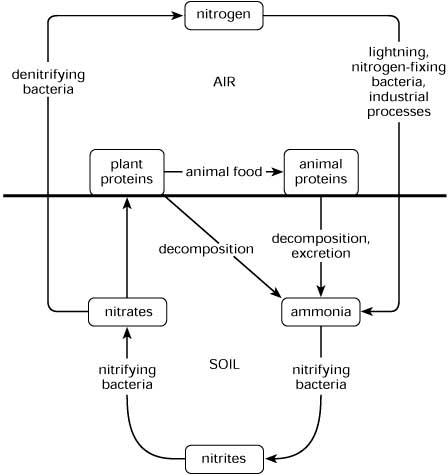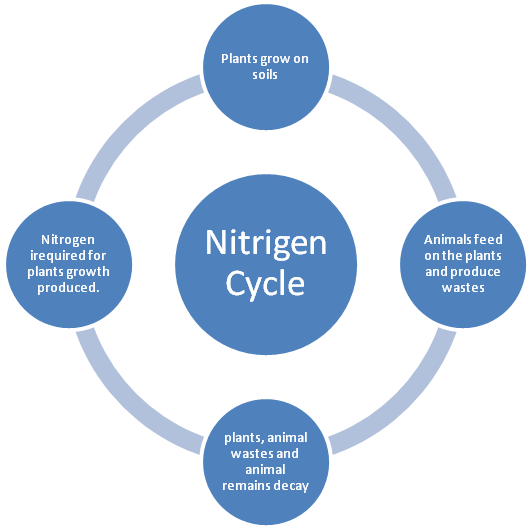Introduction
The nitrogen cycle is a naturally occurring process where the level of nitrogen found in soils is controlled. This is done by decomposition of organic material and absorbing nitrogen from the atmosphere. The process maintains a diversity of plants and animals.
The world has embarked on major industrialization, which has resulted in the use of fossil fuels. Emissions from these fuels affect the nitrogen cycle. Scientists from Brown University and the University of Washington summarizes these effects to increase of nitrogen oxide and nitrogen in the atmosphere. This paper looks into how Burning Fossil Fuels Affect the Nitrogen Cycle.
Nitrogen cycle
The atmosphere is made up of approximately 70% of nitrogen gas (N2); plants require this gas for production. However, they cannot absorb this component directly from the atmosphere. The nitrogen cycle is the process that nitrogen is converted into the inorganic component which a plant can absorb. The process is facilitated by organisms found in soil and o plants’ roots. Nitrogen is also released when organic products decompose and from artificial fertilizers.


Burning of fossil fuels
Fossil fuels are anaerobic decompositions of organic matter for millions of years and are utilized as sources of fuels. Their major component is a carbon (over 90%), but produces among others nitrogen oxides and volatile organic compounds.
How fossil fuels affect nitrogen cycle
With the increase in the industrial process, there has been an increase in use of fuel in production. When fuel is burnt, there are gases produced. They are disposed to the environment and results into global warming. Such gasses include carbon gasses and nitrogen oxide gases. When nitrogen oxide is release, there is the resultant of acid rain/fog. These fogs have a high concentration of nitrogen oxide which when it is filtered in the social it affects the salinity of those soils.
Soils with nitrogen oxide filtered into them loses its potassium and calcium components. Calcium and potassium are important in enhancing balanced plant ecosystems. Soil loses it fertility and growth of plants on such soils is reduced.
Soils affected by acid rains are more acidic that they are expected to be and thus plants do not grow effectively on them. On the other hand animals depend on plants rather indirectly or directly. If social do not grow plants, and then animals lack food.
Nitrogen oxide is a strong compound that is not easily decomposed. When it is swept downstream, it affects aquatic life. This is through killing of aquatic living organisms or affecting the growths of aquatic plants which animals live in water depend on.
Burning of fossil fuels results into green house effect; the resultant is an increase in global warming. It is estimated that there was a 0.74 ± 0.18 °C increase in each temperature changes as a result of green house effect. The increased temperature reduces the natural operation of the environment resulting to interference in nitrogen cycle.
When plants decay, they produce nitrogen that is then utilized by growing plants to grow others; animals then eat these plants. Animals waste and remains is then decomposed on soils, decomposes and nitrogen is produced again. The cycle repeats itself. Any influence in any part of the cycle interrupts nitrogen cycle.
Recommendations
To reduce carbon emissions from fossil duels, nation should join efforts to develop clean technology production. Proper ways of disposal should also be invented. There have been various international conventions aimed at reducing green gas emissions from production with the most recognized one as Kyoto protocol signed on 11 December 1997. Its implementation has not been fully attained since some countries are not willing to abide to the rules set.
Conclusion
Burning of fossil fuels produces gases into the atmosphere which include Nitrogen oxide which in turn affects nitrogen cycle. When nitrogen cycle is interrupted, soils lose their fertility and thus plants produce less when planted on such soils. The effect will be on animals since they depend on plants for food either directly or indirectly. To reduce green house gases emissions gasses nations should join hands and invent clean technology.
Bibliography
Roach, W. John. “How anthropogenic modifications influence the cycling of nitrogen in Indian Bend Wash, an urban desert stream”. Ph.D. diss., Arizona State University ,2005. In Dissertations & Theses: Full Text. Web.
Seitzinger, Sybil. 2008. “Nitrogen cycle: Out of reach.” Nature 452, no. 7184: 162-163. Academic Search Complete. Web.
VonAncken, Eva Elisabeth. “Fossil Fuels and Pollution: The Future of Air Quality.” School Library Journal 56, no. 6 (2010): 123. MasterFILE Premier. Web.